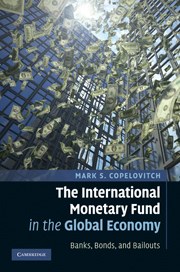Book contents
- Frontmatter
- Contents
- List of figures
- List of tables
- Preface
- 1 The International Monetary Fund in the global economy
- 2 Global finance and the politics of IMF lending: theory
- 3 Global finance and the politics of IMF lending: evidence
- 4 Global finance and IMF lending to Mexico, 1983–1995
- 5 Global finance and IMF lending to South Korea, 1983–1997
- 6 Conclusions
- Appendices
- References
- Index
5 - Global finance and IMF lending to South Korea, 1983–1997
Published online by Cambridge University Press: 06 July 2010
- Frontmatter
- Contents
- List of figures
- List of tables
- Preface
- 1 The International Monetary Fund in the global economy
- 2 Global finance and the politics of IMF lending: theory
- 3 Global finance and the politics of IMF lending: evidence
- 4 Global finance and IMF lending to Mexico, 1983–1995
- 5 Global finance and IMF lending to South Korea, 1983–1997
- 6 Conclusions
- Appendices
- References
- Index
Summary
Thus far, both the statistical evidence and the Mexican case studies lend strong support to both the common agency theory and my core argument linking changes in patterns of financial globalization to variation in IMF lending policies. In this chapter, I conduct a final empirical test by focusing on IMF lending to South Korea from 1983 to 1997. As with the Mexican loans in the 1980s and 1990s, the IMF's three loans to South Korea in this period varied significantly in both size and conditionality. To what extent do changes in the composition of international capital flows – through their impact on G-5 countries' domestic financial interests and the IMF staff's expectations about catalytic financing – explain this variation? In order to answer this question, I once again follow the strategy adopted in the previous chapter. For each South Korean loan, I consider the factors leading the country to request IMF assistance, and I then explore the roles of G-5 governments, the IMF staff, and changing patterns of financial globalization in shaping the Fund's lending decisions. In addition, I assess the extent to which alternative political and economic factors influenced the IMF's decisions in these cases.
South Korea's international debt composition, 1983–97
Although it ranked behind only Mexico and Brazil as the largest sovereign borrower in the 1980s, South Korea was a markedly smaller player in world financial markets.
- Type
- Chapter
- Information
- The International Monetary Fund in the Global EconomyBanks, Bonds, and Bailouts, pp. 246 - 286Publisher: Cambridge University PressPrint publication year: 2010



